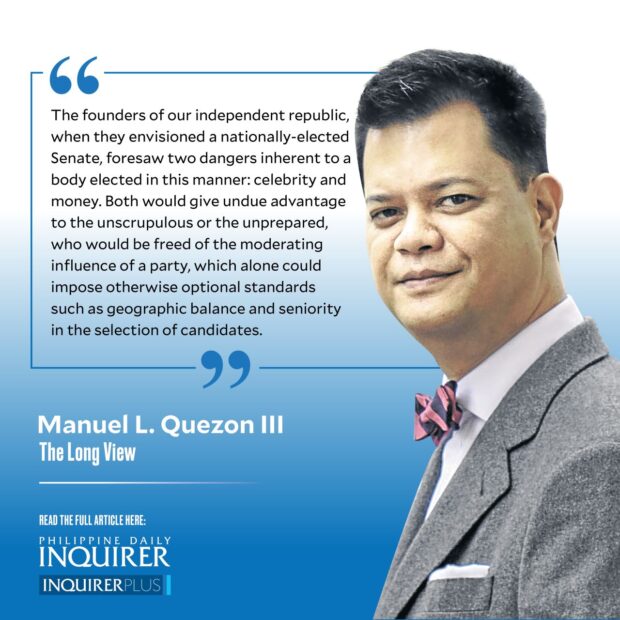The last dodos
The question was this: Could Sen. Robin Padilla be coaxed by Sen. JV Ejercito, then presiding over the Senate, to make a motion on the floor? At stake was National Hijab Day, during which, one observer tweeted, Senators Padilla and Joel Villanueva laughed as breastfeeding and the customs of Muslims and indigenous peoples were being discussed. Millions by now saw how it unfolded and how the motion wasn’t even lost but simply failed, because of translation. To be precise, Padilla, speaking in Filipino, was left to grope for the right term because Ejercito, presiding in English, was unable to supply or even explain it.
The founders of our independent republic, when they envisioned a nationally elected Senate, foresaw two dangers inherent to a body elected in this manner: celebrity and money. Both would give undue advantage to the unscrupulous or the unprepared, who would be freed of the moderating influence of a party, which alone could impose otherwise optional standards such as geographic balance and seniority in the selection of candidates. The antidote proposed was the system of bloc voting, in which a vote for a party would credit all that party’s candidates with a vote. It is no coincidence that shortly after bloc voting was abolished as a supposedly democracy-fostering reform, the first celebrity candidate was elected to the Senate, while veteran senators embarked on party zigzagging by running as “guest candidates.” Fame, whether at the box office or in media itself, could be a ticket to electoral success, just as a private fortune that didn’t need sharing with a party could do the same.
But that era may be coming to an end, and it may be bookmarked by the election of Rogelio de la Rosa, matinee idol, to the Senate in 1957 and that of Robin Padilla in 2022. Consider Vicente Sotto III. There was something symbolic about his retiring from the Senate being followed by the almost-heretical possibility that he, his brother Vic, and pal Joey, might be ousted from “Eat Bulaga!” It’s a story that’s been on-again, off-again, in the entertainment press, one that has an intriguing cast that includes the notorious ex-congressman and ex-felon, Romeo Jalosjos, his son, and allegations that Tito, Vic, and Joey have lost their drawing (and earning) power, making them expendable. For example, in April and May 2022, “Eat Bulaga!” dropped to record lows in timeslot ratings (4 percent and 3.8 percent), a far cry from its heyday during AlDub days when viewership reached up to 50 percent.
There is the question of what control, if any, the trio has over the future of the show since it is owned by a production company, including the possibility the show could remain with its owners while the trio could go to another network, such as Channel 5, which found its ambitions to replace ABS-CBN foiled by Congress warning Manuel V. Pangilinan of dire (investigative, nonrenewal of other franchises) consequences if an announced ABS-CBN and TV5 merger had proceeded last year. In a startling coincidence, even as Pangilinan was being dissuaded from a merger with the Lopezes, the Romualdezes had let it be known they were keenly interested in taking over the ex-Lopez frequencies — and media assets. Just last week, almost a year when the idea was originally floated, it came to pass: the Lopezes announced they were pulling the plug on DZMM’s “Teleradyo” while entering into a joint venture with the Romualdezes who would take over the AM station’s old frequency.
Before the pandemic, television reigned supreme. It still does, but it’s a throne built on quicksand. Kantar data cited by the Asia Video Industry Association in 2021 reported peak viewership at about 45 percent at 8 p.m. in 2017; by 2020, it had gone down to 35 percent: that 10 percentage points reflecting a lost audience of millions. Kantar data commissioned by the Kapisanan ng mga Brodkaster ng Pilipinas had TV viewership, which had been at 94 percent in 2019, falling to 89 percent in 2022; again, a loss of millions. The same sources reported online content consumption growing from 59 percent to 76 percent in the same period. As for TV news, Yvonne Chua’s annual Reuters Institute summary had its reach decline from 66 percent in 2020 to 60 percent in 2022.
It’s a race to the bottom for the old tri-media print, radio, and television, as each ceases to be mass media. Friends of the previous administration feasted on the carcass of ABS-CBN but found it tough to turn the frequencies government awarded to them, into audiences, Advanced Media Broadcasting System being the most notable failure in this regard. The political consequence of all this, then, is by what means can the fame necessary for national election be achieved when no single media can create sustained fame? To be sure, celebrities are being made every day — but will they be the kind that can turn their fame into political capital? There can never be a TitoSen again. Or even a Robinhood. Which might provide the political impetus to abolish or regionalize the Senate as an impossible dream for future politicians.





















